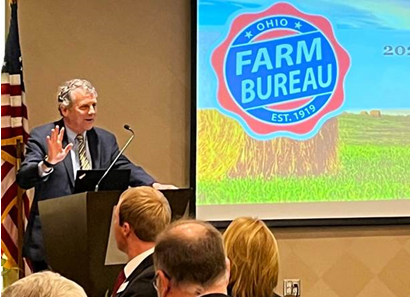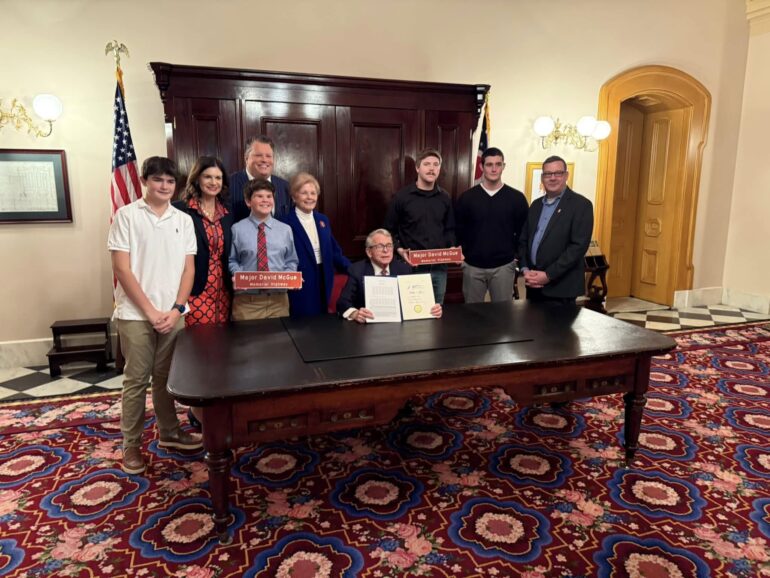Download Our Mobile App And Take WKTN With You . > > > > > > > > > > IT'S FREE!!

Brown is the First Ohioan to Serve on the Senate Agriculture Committee in 50 Years
WASHINGTON, D.C. – Wednesday, U.S. Senator Sherrod Brown (D-OH) delivered remarks at the Ohio Farm Bureau Federation’s Legislative Conference breakfast in Washington, D.C., and discussed with farmers what their priorities are for the 2023 Farm Bill. Brown talked about a number of topics, including provisions secured in the 2018 Farm Bill, the bipartisan Infrastructure Investment and Jobs Act, and how the Inflation Reduction Act will benefit Ohio agriculture, rural development conservation, and urban forestry.
“The best ideas don’t come from Washington, they come from Ohioans. And when writing a Farm Bill, the best ideas come from farmers themselves,” said Brown. “This year, we won’t just be building on the last Farm Bill. We’ll be building all the work we’ve done to build rural infrastructure and improve our supply chains. Whether it’s industrial production or ag production, more and more people are finally beginning to see what we have known for a long time: That it’s better for the long-term health of our economy and our communities when we produce more in America.”
Brown recently met with local farmers, officials from the U.S. Department of Agriculture (USDA), and agriculture stakeholders in Chesterland, Grove City and Wooster to learn what priorities Ohio farmers have for the 2023 Farm Bill. Brown, the first Ohioan to serve on the Senate Agriculture Committee in 50 years, will help write the upcoming Farm Bill.
Brown has long been a leader for Ohio’s rural communities. Before the passage of the Farm Bill in 2008, 2013, and 2018, Brown held roundtables around Ohio to hear from farmers and rural communities about what they wanted to see in the bill, and successfully secured a number of Ohio-specific provisions that were important to the state’s farmers.
Brown’s remarks at the annual breakfast, as prepared for delivery, follow:
It’s great to be able to be with you again and in person for that matter. This spring is the first time the campus has been open for fly-ins since the pandemic began.
I want to start by saying a few words about the tragic train derailment in East Palestine that has gripped Ohioans– especially those living in Columbiana County and other rural communities.
Over the past month, I’ve been to East Palestine multiple times, talking with residents – the mayor, the fire chief, business owners, parents. I’ve heard their fears for what this means for their town and for their futures.
As we shift from the emergency response phase to the long-term clean-up and recovery phase, I know farmers in Columbiana County and the areas surrounding East Palestine are concerned.
During that same roundtable, the Columbiana County Soil and Water Conservation District Director shared some of the concerns of farmers in the region.
Planting season is around the corner and not too far after that farmers will be harvesting alfalfa for dairy feed. No one is sure whether or not their soil or crops are safe and even if their products are safe, they worry that Ohioans will be scared to buy it.
I know farmers need answers. I’m working with the USDA and U.S. EPA to find resources to help pay for soil tests and we’re talking about activating the Food Animal and Residue Network to use their expertise in drugs and toxin impacts on animal agriculture to help.
As I told the residents of East Palestine, I’m here for the long haul. We’re going to be here for months, for the next year, the next ten years working to make sure residents get the support they need and that includes every farmer in Columbiana County.
And one of the biggest opportunities to support farmers across the state is the Farm Bill.
Every five years or so, the Senate Agriculture Committee writes a new bill and it’s one of the most important things I can do to help Ohioans.
You all know that 1-in-7 in Ohioans depend on agriculture for their jobs.
That’s why I joined the Agriculture Committee making me the first Ohio Senator on the Committee in 50 years.
I joined so that I can fight for you, your families, and your communities.
This will be my fourth Farm Bill in the Senate.
As conversations around the 2023 Farm Bill ramp-up, we are holding hearings and reviewing every title of the farm bill.
And in the next couple months, we’ll write a bill that delivers for our farmers and our rural communities.
It’s something we always do in a bipartisan way – the 2018 Farm Bill passed by a final vote of 87 to 13. Maybe this time we’ll get 90 votes.
That’s one of the reasons I worked to get on the Senate Ag Committee because it has a reputation – along with the Veterans Committee, which I am also proud to serve on – for being one of the most bipartisan committees in the Senate.
I look forward to working with Senators Stabenow and Boozman and all the members of the committee to continue that bipartisan tradition.
Before we talk about the priorities for the next Farm Bill and what I’ll be fighting for on behalf of Ohio agriculture, I wanted to talk about where we’ve been.
I often say that the best ideas don’t come from Washington, they come from Ohioans.
And when writing a Farm Bill, the best ideas come from farmers themselves.
It’s why leading up to every Farm Bill, we’ve held roundtables around the state.
Last year, I was at President Bill Patterson’s farm – Patterson Fruit Farm in Chesterland. I learned a lot and I also left with some delicious apples that Connie and I – with the help of our grandkids – turned into apple sauce.
We hosted one in Wooster too and have enjoyed having Ohioans stop by the D.C. to meet with staff and share their Farm Bill priorities.
Many of the wins I’ve secured in previous farm bill came directly from you, from these roundtables and from these meetings.
In the 2018 Farm Bill, we preserved and strengthened the safety net that farmers rely on to help them mitigate risk and prevent bankruptcies.
We defended crop insurance and improved the Average Risk Coverage (ARC) program that I helped develop with the Republican Majority Whip, John Thune of South Dakota.
As many of you remember, Senator Thune and I led the way in creating the ARC program in the 2014 Farm Bill. We based it on what I heard from farmers across Ohio.
In 2018, we improved conservation programs.
We got an amendment in the bill to increase the cost-share for EQIP.
We also created a new CRP program – called CLEAR, or the Clean Lakes Estuaries and Rivers Program – that aimed to enroll 5 million acres of farmland that directly protect water quality and allow CRP to better work in Ohio.
This year, we won’t just be building on the last Farm Bill.
We’ll be building all the work we’ve done to build rural infrastructure and improve our supply chains.
Technology and innovation in agriculture continues to advance – auto steer tractors that rely on GPS, in-field monitoring, electric tractors, vehicles.
But much of the new technology is dependent on reliable broadband – not only in the field, but also in your homes, as you track the weather and do your books.
The Bipartisan Infrastructure Law includes big broadband investments. We want to work with you – and with mayors and county commissioners and township trustees – to make sure that Ohio gets our fair share, or more, of that investment.
It’s the same thing with bridges. Ohio has more than 3,200 bridges that need repair.
We also passed the Inflation Reduction Act, with $40 billion in agriculture, forestry, and rural development investments.
And we included new incentives that will expand markets for homegrown American biofuels.
We also included a new investment tax credit to help offset the upfront costs associated with building biodigester – something Sen Thune and I fought for.
As we look to the 2023 Farm Bill, we know that climate is going to be a factor – because it’s a factor for your farms already.
You all see the changes in growing seasons. No one knows the weather better than Ohio farmers.
Your voices need to be in the room.
We are going to improve on what we secured in the last farm bill and fight to ensure the $18 billion in conservation funding included in the Inflation Reduction Act works for Ohio farmers.
I also know problems with inflation have been hurting farmers and rural communities, from fertilizer to fuel prices.
This reality will be at the forefront of the Farm Bill effort. I’m going fight to ensure the 2023 Farm Bill preserves and strengthens Title 1 programs and crop insurance.
We also know one of the big causes of inflation has been global supply chains that are too long and too fragile.
We need investments in domestic production of fertilizer, and new research on how to do more with less.
You shouldn’t have to depend on fertilizer inputs or natural gas inputs from hostile foreign nations.
And it’s about domestic markets too.
I want to make it easier for farmers to feed their communities and for consumers to buy local Ohio food and farm products. That keeps money where it belongs: here in our communities.
We made progress on that in 2018, with the Local FARMS Act. And we’re going to build on that again.
That’s why I introduced the Strengthening Local Processing Act with Senator Thune to invest in small and mid-sized meat and poultry processing facilities and in workforce development to train the next generation of butchers and plant managers.
It’s why in the coming weeks I’ll introduce the Local Farms and Food Act to expand and improve USDA local and regional food systems grant programs.
Whether it’s industrial production or ag production, more and more people are finally beginning to see what we have known for a long time: That it’s better for the long-term health of our economy and our communities when we produce more in America.
Whether it’s semiconductors from Asia or beef from Brazil, there’s a cost to those supply chains – and there’s a benefit to Ohioans when we bring them home.
And bringing supply chains home means protecting our farmland and rural communities from foreign adversaries and billionaires who see it as a good investment.
That’s why Senator Grassley and I introduced the Farm Credit for Americans Act to ensure that the federally created Farm Credit System serves Americans not foreign investors.
And I’ll be fighting for childcare. Without quality, affordable childcare, our rural communities can’t grow and develop. It’s a problem we can and will address.
There’s a lot we want to get done to support ag and help our farmers – so keep calling on us in Washington so we can ensure the 2023 Farm Bill includes the issues that matter most to Ohio farmers.
Thank you.
Written by: WKTN Staff
Similar posts
Copyright WKTN-Home Town Media | Public File | FCC Applications | ADMIN | 112 N. Detroit Street, Kenton, OH 43326 | 419-675-2355


